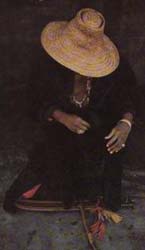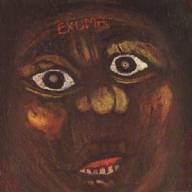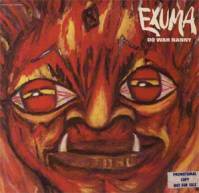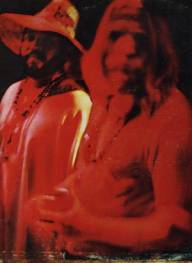EXUMA- THE OBEAH MAN

by Brian Philips
- He was a spirit who came from a planet, now extinct, brought to us on a lightning bolt, who had communed with Charon, the ferryman of the River Styx and Vodun priests. When he informed the world of his travels and even warned of Armageddon, he left the Earth, perhaps tiring of the corporeal and moving to the ethereal.
- He was born McFarlane Anthony McKay on Cat Island in the Bahamas in the early 1940's. He then relocated to New York, to study architecture at the age of 17. He ran out of money for his studies and in 1962, participated in folk music hootenannies. Gaining confidence, he started a group called Tony McKay and the Islanders. He also was in a show called A Little of This 'n' That in 1965, along with Richie Havens.
- He was a marketing nightmare. Who knew how to peg him? Finding his records has never been an easy task. Often, through dint of color, he was placed in the Soul or R&B bin, even though his music, while soulful, does not belong in either. When his first album was released in 1970, there were sections for music of other countries, however, since he lived in New York and recorded for Mercury, it may have looked out of place there. His music was not Ska or Reggae. He was a contemporary of Bob Dylan's and Peter Paul and Mary, even playing the Café Wha? and the Bitter End in Greenwich Village, but his music wasn't quite from the same branch of Folk singing as Dylan, Woody Guthrie or Ramblin' Jack Elliott. His albums couldn't be placed in Rock; besides, who would get it if it was put there?
All of the above answers are, in varying
degrees, "correct."
As the years passed, the '60's saw many streams of music presenting themselves, such as the now dubbed "garage" music and psychedelia. Folk music in its acoustic form had waned in popularity and had given way to Folk-Rock. Blues was enjoying a resurgence; in other words, by the close of the sixties, the popular musical palette had grown considerably varied.
Enter Dr. John, the Night Tripper.
Session man Mac Rebennack invented the Dr. John persona for his first album,
Gris-Gris which was a fascinating blend of Voodoo, Rhythm and Blues and
psychedelia and garnered much critical and popular attention
on 1968.
One person who became most interested in
Psychedelia was a gentleman named Bob Wyld, who along with Art Polhemus
was managing the Blues Magoos. The Blues Magoos released several
albums and had a hit single, "We Ain't Got Nothing Yet." Wyld
located Exuma and convinced Mercury Records to sign him, in hopes of creating
something in the Dr. John vein. Wyld
even participated in the project under
the pseudonym "Daddy Ya-Ya."
It is difficult to describe the music of
Exuma. Many times, there is not much in the way of instrumentation;
most of the songs are anchored around his singing and acoustic guitar playing.
It is undeniably African-influenced, with much exotic percussion, but it
is also grounded in Voodoo beliefs found in the West Indies. His
guitar playing is solid, but not flashy. He once said in an
interview, "I only know a few chords,
but I can stretch them out!" His greatest instrument was his voice.
It was a thing of ragged beauty. Neither too high nor low, it compelled
and beckoned, sounding as if he had experienced many things in many planes.

On the first album of Exuma (called Exuma, but subtitled "Fire") you hear a wolf's howl, acoustic guitar, bongos and bells. Then a gravelly voice sings:
"I came down on a lightning bolt
Nine months in my Mama's belly.
When I was born, the midwife scream and
shout,
I had fire crystals coming out of my mouth.
I'm Exuma, I'm the Obeah Man!"
The lyrics get even more colorful after this, if you can believe it. He makes mention of walking with Charon (the ferryman at the River Styx) and Hector Hippolyte (artist and Voodoo priest). The backing vocals are dolorous and chant-like; there are bird calls and the whole affair ends with a sonic boom.
Then, the SECOND song starts up!
This was 1970. The Guess Who were angering certain people with their song, "American Woman", which some took to be anti-patriotic, so one can only gather what the reaction to this album would have engendered among the same factions.
One track, "Séance in the Sixth Fret," is exactly that; a séance. While "Black Mass" by Lucifer (Mort Garson) has a simulation of a séance on it, the listener can become detached, as the album is played entirely on synthesizer. This doesn't feel simulated (there is musical backing, but the words are prose, not poetry), even if no dead people spoke to anyone involved with the record. He calls out the names of three deceased people and there are sound effects; not quite a field recording, nor does it have the feel of an Andy Hardy musical in which Mickey Rooney turns to Judy Garland, and says "Hey, let's put on a séance!"
The illustrations on the album are also
rather odd. An anguished face on the cover, the foldout picture features
two white, silhouetted profiles looking in opposite directions, reminiscent
of the Greek God Janus, with two wings behind it. The back cover features
a butterfly, whose wings feature two sets of eyes, one set eerily reminiscent
of the eyes of the anguished face on
the front cover!
There are no photos of his accompanists, named the "Junk Band." The personnel is semi-shrouded in pseudonym (not unlike Captain Beefheart's Trout Mask Replica album or, for that matter, Dr. John's Gumbo album):
Backup vocals are credited to Mildred Vaney (later in Cut Glass) and Frankie Gearing (credited on the album as the Mama Loi's), who was in the Steinways and later joined Quiet Elegance, which featured Martha Reeves' sister, Lois. The now-eerily credited "Princess Diana" was Diana Claudia Bunea, who was seeing Wyld at the time and Sally O'Brien who was dating Exuma.
While looking through several albums, the most interesting bit of information uncovered was that the man credited as "Spy Boy" Thielhelm, "Peppy, the Spy Boy" and "Peppy Theilhelm " turned out to be none other than Peppy Castro, lead vocalist of the Blues Magoos!
How did THIS happen? Well, Castro
and Exuma were labelmates and also shared management. Imagine tales
of Bahamian folklore and what Castro described as the "tribal" nature of
recording. (Castro also had played both Berger and Woof in Hair,
which was called "The American Tribal Love Rock Musical"). Castro
was glad to participate in a project unfettered. "I didn't have any of
the stresses of a typical rock band; I just showed up and did it."
Some of the lyrics are quite dramatic and chilling:
"A spider crawled across my face,
Spreading it's web on the human race
Mama Loi, Papa Loi
I see fire in the dead man's eye"
- "Mama Loi, Papa Loi"
"You won't go to Heaven,
You won't go to Hell,
You'll remain in your graves,
With the stench and the smell."
O Dambala, come Dambala.
- "Dambala"
In short, by the end of the album, you might well be convinced that Exuma is, shall we say, DEAD serious about Voodoo. Dr. John was a persona; Exuma seemed oddly real, possibly due to lack of clear photographs, possibly the dolorous and haunting vocals and sparse instrumentation. Exuma was indeed well-versed in Bahamian folklore and even carried around various herbal remedies.
This album garnered some attention, but didn't sell horribly well. It must have made something of a splash as his song "You Don't Know What's Going On" was used for the film Joe. This may have also been a ploy by Mercury, since it was they who issued the soundtrack album.
There was not much different in his next album, Exuma II, which was also released in 1970. The album starts off with the striking "Damn Fool" ("You thought you married a woman? /You married a big black bird!"). Instead of a Séance' there is a Zombie revival ("Paul Simon Nontooth") and while this album is not amazing as the first, it is still very good indeed. And once again, while Billboard had given both albums high marks, neither sold well.
In what has to be one of the quicker fits of impatience in recording history, after two albums in one year and a couple of singles, Exuma was dropped by Mercury. The first album could have been tapped easily for a single with "You Don't Know What's Going On," especially with the movie tie-in. Instead, Mercury released "Exuma," which is a fine song, six minutes in length that should not be edited; not a wise one to choose for an artist that is debuting. Mercury released "Damn Fool" as a single from the second album. While being a fine song, it's a questionable choice, considering the "D" word is the first word in the song and is repeated many times after. This probably didn't endear Exuma to many radio program directors, even though he was getting some FM airplay.
By 1971, Exuma was signed to Kama Sutra, which at first glance may seem odd, since it was part of the Buddah (read bubblegum) empire. However, by the 1970's they were looking for a hit and were distributing various labels, such as Curtis Mayfield's Curtom and Holland-Dozier-Holland's Invictus label.

His first album for Kama Sutra, Do Wah Nanny shows an expansion of instrumentation and the change is most welcome, as the title track roars through the speakers, sounding not unlike Soca music. The lyrics are still just as surprising and stark as always (one line is "She is Satan's next of kin") and for the first time on record, Exuma shows his socially conscious side with "The Bowery" a powerful statement on being homeless. It is a strong album, suffering only from some songs being drawn out too long ("22nd Century" goes on for nine minutes). Do Wah Nanny was released as a single from this album and considering that "Day After Day" by Shango had been a hit a couple of years earlier, this could have had a chance on the radio, but it was sadly not to be.
Snake continues the hot streak for Exuma musically, not only keeping the horns but expanding the musical palette. It is an album of contradictions, to be sure. "Summertime in New York" is a stark minor key song in a slow tempo, with only a sparse accompaniment, while the song with a lilting chorus in a major key, is called "Subway Bound for Hell"! The title track is another stomper with sexual imagery guaranteed to keep it well away from the radio.
His stage shows were well received; they went down with Sly and the Family Stone's audience. They must have been quite a sight, Exuma and his Junk Band dressed in ponchos and glitter.
Had Exuma released only these four albums and never recorded again, it would have permanently enshrined him as one of the great undiscovered artists of the 1970's. The next two releases scuttled Exuma musically. All albums after this no longer featured the hand of Bob Wyld. Whether Wyld left of his own volition or due to Kama Sutra's meddling or Exuma wanting him gone (he was known to change bands as it suited him), it is not known. Kama Sutra, instead of dropping an obviously talented singer and songwriter as Exuma, who was not selling, released the next two albums that reeked of "marketing." Reincarnation and Life proved to be the end of Exuma's connection with major labels.
Of Reincarnation, the less said the better. Trouble is on the horizon when the best songs on the record are "Brown Girl," an old folk song and "Monkberry Moon Delight," a Paul McCartney tune. This album is undoubtedly his low point, musically.
Life is a bit of a rebound, but not much of one. "Night Time People" is a good song; however, right after that is the dreadful "Hayride," which proves that Exuma should never record a Country & Western album. "Kenyatta Alisha," probably written for his daughter, has him sounding like Cat Stevens, not Exuma. While the album is lively and energetically sung, it shows seams. Exuma released SIX albums in three years and there is a serious reliance on covers. Also, what he chose to cover is quite odd! The Rolling Stones' "Paint It, Black" and "You Can't Always Get What You Want" and Mickey and Sylvia's "Love is Strange" illustrate this point!
A harbinger of bad times to come; there is a poem on the inside jacket entitled, "Armageddon", which is stark, chilling arguably the best lyrics on the album and... not a song on the album.
The effect of these two albums is not unlike seeing Burt Lancaster in Jim Thorpe's All-American. Save the (not unjustifiable) argument of casting, one scene shows one of the greatest athletes of the twentieth century after the Olympics, stripped of his medals, due to racism and adjudged on-amateur status during the games. Where is he? He is at a dance contest, giving out prizes and he is wearing an outfit that is everyone's conception of what Indians should where. Thorpe (Lancaster) is doling out trinkets listlessly in low tones, his pride in tatters.
Not having met Exuma, the last two albums have almost the same effect; the introductions of any non-Western instruments are not at the forefront. The instruments are made tasteful and safe. There is a good-timey feeling about them, but it seems forced and while one cannot scowl and be ominous all of the time (Exuma was not one to be stuck in an artistic rut), if this is the alternative, it doesn't wear well. With the persona stripped away and the music in such shape, this is a letdown.
Exuma didn't record again for seven years. This is not to say that he sat idle, though. He performed at the New Orleans Jazz Festival from 1978 to 1991, opened for such diverse acts as Toots and the Maytals, Steppenwolf, Black Flag and X, toured the world. He even was awarded the British Empire Medal by Queen Elizabeth II.
 Exuma
was not without fans in the music business. His songs were covered
by Jimmy Castor ("Bam Bam"), Laurie Freelove, formerly of Two Nice Girls
("Damn Fool") and Dr. Nina Simone ("22nd Century", "Obeah Woman") and attracted
many fine musicians on his albums, such as Castro, pianist Patti Bown,
vocalist Aziza Bey (who had earlier recorded as Elena), drummer
Exuma
was not without fans in the music business. His songs were covered
by Jimmy Castor ("Bam Bam"), Laurie Freelove, formerly of Two Nice Girls
("Damn Fool") and Dr. Nina Simone ("22nd Century", "Obeah Woman") and attracted
many fine musicians on his albums, such as Castro, pianist Patti Bown,
vocalist Aziza Bey (who had earlier recorded as Elena), drummer
Bernard Purdie and Pee Wee Ellis, who
was a musical director for James Brown.
1980 brought Penny Sausage. This album is decidedly better than the last two on Kama Sutra, but a lackluster production and a paucity of ideas ("Armageddon" is the song of the seven year old poem) tend to sink it a bit. It even starts with a song, "The Obeah Man Returns" that sounds a bit too much like "Exuma, the Obeah Man" from his first album. There is a freedom about it perhaps due to no more major label pressure, that does buoy the album and Exuma is still in fine voice.
His last two albums were Universal Exuma and Street Life. By this time, Exuma was enjoying his greatest recognition. In the Bahamas, he even scored two hit singles, "Shirlene" and "Rose Mary Smith." He had moved to New Orleans and was a regular at the New Orleans Jazz and Heritage festival. He performed regularly at the Old Absinthe Bar. These nights could become jam sessions, as he had a habit of starting songs that were not in the set list and he still attracted great musicians, such as Bill Wyman and Bob Dylan's backing band.
After he had a mild heart attack, the last
years of his life saw him splitting his time between Miami, FL and the
Bahamas, in a house that his mother had left him. He was happy, if
not horribly rich from three decades in the music business. Peppy
Castro visited him there and recalled that the house was "bug-infeste...
he had a mattress on the floor and he was surrounded by his paintings and
tapes of his music". Castro offered to record him, if Exuma decided
to visit New York again. This day never came, for when he next visited
in 1997, he found that Exuma had died in his sleep.
Exuma was a man who left a great legacy of music and paintings, one of which was purchased by no less than film director Jonathan Demme. One wonders if the butterfly on the Silence of the Lambs posters might have been suggested by the butterfly on the back cover of Exuma's first album!
It would also seem that he never made enemies. Even though he changed bands, almost none of the former band members had harsh words about him. Imagine playing with someone whose music was at times, Folk, Reggae, Country and Western or Rock. Near the time of his death, he was shopping an album to various record labels and sadly, we can only imagine what it would have sounded like (Polka, anyone?).
Musician, painter and poet, Exuma lives!
Discography:
1. Exuma (LP Mercury 1970, CD TRC 1993)
2. Exuma II (LP Mercury 1970, CD TRC 1993)
3. Do Wah Nanny (LP Kama Sutra1971, CD Castle 1993)
4. Snake (LP Kama Sutra 1972, CD Castle 1993)
5. Reincarnation (LP Kama Sutra 1972, CD Castle 1993)
6. Life (LP Buddah 1973, CD Castle 1993)
7. Penny Sausage (Inagua 1980)
8. Going to Cat Island (??)
9. Universal Exuma (??)
10. Rude Boy (ROIR 1986) (originally released as Street Life)
Singles:
Exuma, The Obeah Man/Junkanoo (Mercury)
Damn Fool/Zandoo (Mercury)
Do Wah Nanny/The Bowery (Kama Sutra)
Monkberry Moon Delight (Kama Sutra)
Brown Girl/Rushing Through the Crowd (Buddah)
Special thanks to Aziza Bey, Emilio "Peppy" Castro and Laurie Freelove
for their help in the preparation of this article. Also, thank you
to Stephen Phillips, my brother, who introduced me to Exuma's music and
to my wife Rhonda Phillips-Guy.
Bibliography
Offbeat Magazine, p. 48, Scaramuzzo, Gene, "The Life and Music of Exuma"
Glossary:
Dambala - Serpent Spirit
Mama Loi Vodun Priestess
Papa Loi Vodun Priest
Obeah Vodun
Vodun Polytheistic belief system culled from African origins.
Vodun translates from the West African as "spirit".